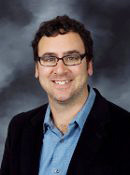Timothy Schulz (ECE/ICC-DataS) is the principal investigator (PI) on a project that has received a $30,000 research and development grant from the University of Arizona.
The project is titled “Multiscale Phase Retrieval.”
Timothy Schulz (ECE/ICC-DataS) is the principal investigator (PI) on a project that has received a $30,000 research and development grant from the University of Arizona.
The project is titled “Multiscale Phase Retrieval.”

University Professor Timothy Schulz (ECE) will be featured at the Michigan Tech Research Forum (MTRF) at 4:30 p.m. Wednesday, Oct. 14.
Schulz’s presentation is titled “Direct Measurement of Coherent Fields.” Additional details can be found on the MTRF website.
The presentation will be available via Zoom and a limited number of people will be permitted to attend in person, dependent on university guidelines on the date of the event. If you wish to be considered for in-person attendance, complete this form by today (Oct. 9).
Schulz is a member of the ICC’s Center for Data Sciences.
The MTRF is presented by the Office of the Provost in coordination with the Office of the Vice President for Research. The forum showcases and celebrates the work of Michigan Tech researchers and aims to strengthen discussions in our community. All are welcome, including the general public.

Timothy Schulz, professor of electrical and computer engineering and member of the ICC Center for Data Science, has been awarded the prestigious University Professor title, which recognizes faculty members who have made outstanding scholarly contributions to the University and their discipline over a substantial period of time.
The University’s most prestigious faculty awards–announced last spring–were presented Wednesday, September 18, at a ceremony in the Van Pelt and Opie Library. Making the presentations were University President Richard Koubek, Provost and Senior Vice President for Academic Affairs Jacqueline Huntoon and Vice President for Research David Reed.
 The Office of the Provost and Senior Vice President for Academic Affairs has announced that Dr. Timothy Schulz (DataS), professor of Electrical and Computer Engineering, has been named a 2019 University Professor.
The Office of the Provost and Senior Vice President for Academic Affairs has announced that Dr. Timothy Schulz (DataS), professor of Electrical and Computer Engineering, has been named a 2019 University Professor.
The University Professor title recognizes faculty members who have made outstanding scholarly contributions to the University and their discipline over a substantial period of time. University Professors will not exceed 2% of the total number of tenured and tenure-track faculty at Michigan Tech. This year, two professors were awarded the title of University Professor. The second recipient is Dr. Kathleen Halvorsen, professor of Natural Resource Policy in the Department of Social Sciences.
The confidential process for selecting recipients spans the academic year and recipients for each award are notified in mid-May. Additional details regarding the award and selection procedures can be found on the provost’s website: mtu.edu/provost/faculty/awards.
 by Michael R. Meyer, Director William G. Jackson CTL
by Michael R. Meyer, Director William G. Jackson CTL
College of Engineering Dean Janet Callahan has selected Tim Schulz (ECE) as the final member of the 2019 Deans’ Teaching Showcase. As a teacher he is widely acknowledged as one of the ECE departments best, with his friendly, humorous style and his devotion to his students’ learning. But Schulz’s selection here is, according to Associate Dean Leonard Bohmann for his “leadership in using technology to deliver technical material in electrical and computer engineering.”
Starting in 2012, Schulz created a series of 10 to 15 minute videos collectively titled “Electric Circuits” and posted them on YouTube. Though he created them with his EE2111 (Electric Circuits 1) class in mind, they are reaching a much wider audience. In fact, one titled “Introduction to Thevenin Equivalent Circuits” has gotten more than 152,000 views.
Since that time, Schulz has also developed a phone app of randomized electric circuit problems to use in this course. He develops these aids so students can develop a mastery of the course material. As one student noted, “The videos and the infinite practice problems were the most helpful. As much as I hate to say this, the quizzes were also helpful.”
In his courses, Schulz develops from scratch his own interactive web-based approach to homework sets and quizzes, taking full advantage of the capabilities of Canvas and writing his own scripts for generating homework problems with randomized parameters. His colleagues recognize this, and some have adopted Schulz’s materials when they teach the same classes.
Most recently, Schulz has taken the lead in developing new courses for the online MSEE program with a focus on communications and signal processing, in partnership with Keypath Education, Inc. He developed and is teaching for the second time, EE5300, Mathematical and Computational Methods in Engineering, which is the entry point into the program.
His course engages students through a series of interactive MATLAB computational exercises which meet modern standards for online course delivery and are breaking new ground for the ECE Department.
Students find this approach to be very helpful. One said, “The canvas structure paired with the lecture truly was a great combination. The prep work must have been substantial but was well worth it.”
Another provides even broader praise of both Schulz and the course by saying, “The course is excellent and engaging. Overall, I think this class is a must for any student wishing to have a solid starting foundation in graduate studies in engineering. Dr. Schulz is an outstanding professor with extensive research and professional experience and I would totally recommend students to take this class.”
Schulz is currently developing the third course for the online MSEE program, EE5500 Probability and Stochastic Processes, which will be taught for the first time this summer. He agrees that developing an online course is much more rigorous then teaching face-to-face, saying “You need to do more planning of how to approach a topic. You don’t have the ease of correcting an approach (or even an equation) in real time, so it is a much more deliberate process.”
However, this higher level of rigor is a challenge he enjoys; he’s already signed on to develop his next course, EE5521 Detection and Estimation Theory, which will be offered online for the first time sometime in 2020-2021 academic year.
Callahan emphasizes that it’s really about the technology enabling better learning. In her words, “Tim Schulz’s effective use of technology shows that student learning and satisfaction can both increase with the use of modern tools.”
Schulz will be recognized at an end-of-term luncheon with other showcase members and is now elgible for one of three new teaching awards to be given by the William G. Jackson Center for Teaching and Learning this summer recognizing introductory or large class teaching, innovative or outside the classroom teaching methods, or work in curriculum and assessment.


Timothy Havens (DataS) and Timothy Schulz (DataS) were recently awarded a $15,000 contract from MIT Lincoln Laboratory to investigate signal processing for active phased array systems with simultaneous transmit and receive capability. While this capability offers increased performance in communications, radar, and electronic warfare applications, the challenging aspect is that a high-level of isolation must be achieved between the transmit and receive antennas in order to mitigate self-interference in the array. This project spearheads a collaboration with Dr. Jon Doane (BS and MS from MTU) in MIT Lincoln Laboratory’s RF Technology Group. Ian Cummings, an NSF Graduate Research Fellow who is co-advised by Havens and Schulz, is undertaking this research for his PhD dissertation and will spend the summers at MIT Lincoln Laboratory as part of the project.